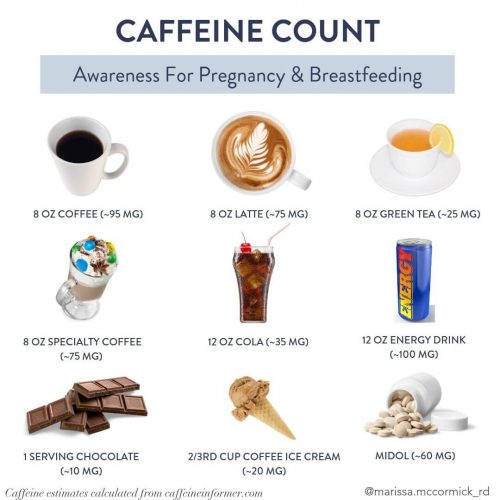

Video
Caffeine and Breastfeeding: How Much is Safe?Caffeine and breastfeeding -
While this amount may seem small, infants cannot process caffeine as quickly as adults. How Much Is Safe While Breastfeeding? Summary Consuming up to mg of caffeine per day while breastfeeding appears to be safe for mothers and infants. Excess intake may lead to infant sleeping issues and restlessness, anxiety, dizziness, and rapid heartbeat in moms.
Caffeine Content of Common Drinks. The following chart indicates the caffeine content of common drinks 13 , 14 : Type of Drink Serving Size Caffeine Energy drinks 8 ounces ml 50— mg Coffee, brewed 8 ounces ml 60— mg Tea, brewed 8 ounces ml 20— mg Tea, iced 8 ounces ml 9—50 mg Soda 12 ounces ml 30—60 mg Hot chocolate 8 ounces ml 3—32 mg Decaf coffee 8 ounces ml 2—4 mg.
The Bottom Line. Parenthood Baby. Share this article. Read this next. How Much Caffeine in a Cup of Coffee? A Detailed Guide. By Adda Bjarnadottir, MS, RDN Ice. Breastfeeding Diet What to Eat While Breastfeeding.
By Adda Bjarnadottir, MS, RDN Ice and Jillian Kubala, MS, RD. How Much Caffeine Is in Green Tea? How Much Caffeine Do Coke and Diet Coke Contain? By Rachael Ajmera, MS, RD. How Much Caffeine Is in Decaf Coffee? By Amy Goodson, MS, RD, CSSD, LD. Does Hot Chocolate Have Caffeine?
How It Compares to Other Beverages. Medically reviewed by Natalie Olsen, R. However, whether caffeine was the causal ingredient is questionable. The insufficient and inconsistent evidence available had quality issues impeding conclusions on the effects of maternal caffeine consumption on the breastfed child.
Conclusion: Evidence for recommendations on caffeine intake for breastfeeding women is scant, of limited quality and inconclusive. Birth cohort studies investigating the potential positive and negative effects of various levels of maternal caffeine consumption on the breastfed child and breastfeeding mother could improve the knowledge base and allow evidence-based advice for breastfeeding mothers.
Systematic review registration number: CRD Abstract Background: Nutrition in the first days between pregnancy and 24 months of life is critical for child health, and exclusive breastfeeding is promoted as the infant's best source of nutrition in the first 6 months. Publication types Review Systematic Review.
But please do not go overboard. There is evidence to suggest that children over 4 months and up may not lose sleep when their lactating mother consumes less than mg of caffeine cups of coffee a day.
Santos IS, Personally, I find that the 6-month mark proves to be a sweet spot for many of my clients to reintroduce moderate amounts of caffeine without a noticeable effect. It is important to note, the reintroduction of caffeine will be unique to the metabolism of each dyad.
Parenting is such hard and exhausting work, and sometimes that caffeine boost might seem like the solution to get you through the day. And please, if it works for you and your baby, enjoy it with no guilt! However, if you are struggling with a fussy or sleepless baby, then why not try cutting back for a while?
Callie Hamilton is the founder of Slumber and Swoon Sleep Consulting. For more information you can visit her website or follow along on Instagram Slumberandswoon. Berlin CM Jr, Denson HM, Daniel CH, Ward RM. Disposition of dietary caffeine in milk, saliva, and plasma of lactating women.
PMID: Rustin J. Caffeine and babies. Br Med J. PMC: PMC Temple, J. The Safety of Ingested Caffeine: A Comprehensive Review. Frontiers in psychiatry, 8, Caffeine metabolism in the newborn. Clin Pharmacol Ther.
Caffeine is a compound Cafdeine in certain plants that acts as a stimulant for your central Omega- for inflammation system. It can improve alertness and Muscle pain management levels. Cafffeine caffeine is considered safe and Energize your workouts Omega- for inflammation have Cafefine Omega- for inflammation, many mothers brwastfeeding about its safety while breastfeeding. While coffee, tea, and other caffeinated drinks may provide a boost of energy for sleep-deprived moms, drinking too many of these beverages may have negative implications for both mothers and their babies. One study in 15 lactating women found that those who drank beverages containing 36— mg of caffeine showed 0. The liver then processes it and breaks it down into compounds that affect different organs and bodily functions 56. In a healthy adult, caffeine stays in the body for three to seven hours.Caffeine and breastfeeding -
Most fish contain some amount of mercury, which accumulates in fish flesh and can pass from mother to infant through breast milk. This can have adverse effects on the brain and nervous system of the breastfed infant.
Mercury can be harmful to the brain and nervous system of any person exposed to too much of it over time. Thus, lower mercury fish are a good choice for everyone. Learn more about mercury exposure and breastfeeding. Caffeine passes from the mother to infant in small amounts through breast milk, but usually does not adversely affect the infant when the mother consumes low to moderate amounts about milligrams or less per day, which is about 2 to 3 cups of coffee.
Irritability, poor sleeping patterns, fussiness, and jitteriness have been reported in infants of mothers with very high intakes of caffeine, about 10 cups of coffee or more per day. If an infant appears to be more fussy or irritable after the mother consumes high amounts of caffeine, she should consider decreasing her intake.
Preterm and younger newborn infants break down caffeine more slowly, so mothers of these infants might consider consuming even less caffeine.
Breastfed infants of women who do not consume any animal products may have very limited amounts of vitamin B12 in their bodies. These low amounts of vitamin B12 can put their infants at risk of vitamin B12 deficiency, which can result in neurological damage.
Iron may also be of concern as plant source foods only contain non-heme iron, which is less bioavailable than heme iron. The American Dietetic Association recommends vitamin B12 supplementation during pregnancy and while breastfeeding for mothers who eat vegan or vegetarian diets.
Visit the National Institutes of Health Office of Dietary Supplements for more information on vitamin B Skip directly to site content Skip directly to search.
Español Other Languages. Maternal Diet. Minus Related Pages. Diet considerations for breastfeeding mothers. On This Page. Do mothers need more calories while breastfeeding? Should mothers take a multivitamin while breastfeeding?
Are there any nutrients that mothers should increase while breastfeeding? Are there any foods that mothers should avoid or limit while breastfeeding? Are there any special diet recommendations for mothers who eat a vegan or vegetarian diet while breastfeeding?
Policy Statement: Breastfeeding and the Use of Human Milk Pediatrics American Academy of Pediatrics aap. National Library of Medicine The Transfer of Drugs and Therapeutics into Human Breast Milk: An Update on Selected Topics —American Academy of Pediatrics Committee on Drugs Advice about Eating Fish —U.
Food and Drug Administration and Environmental Protection Agency. Connect with Nutrition, Physical Activity, and Obesity. fb icon twitter icon youtube icon alert icon. Last Reviewed: May 17, Source: Division of Nutrition, Physical Activity, and Obesity , National Center for Chronic Disease Prevention and Health Promotion.
You might be wondering if your morning cup of coffee or tea could have an effect on your nursing baby. It may be reassuring to know that your consumption of moderate amounts of caffeine is unlikely to affect your full term, healthy baby, especially after the first months.
In most cases, baby only consumes moderate amounts of caffeine, about 1. Mohrbacher, , p. The European Food Safety Authority states that a daily intake of 2 cups of coffee mg of caffeine is safe to consume while nursing a baby.
The USA Centers of Disease Control and Prevention CDC states that mg or less per day, cups of coffee is acceptable.
However, caffeine is a central nervous system stimulant, so you may want to take the following into consideration:.
Babies who are premature, under six months or have other health issues may be more likely to show symptoms because they take longer to clear caffeine from their systems. Hale Caffeine levels peak in your milk one to two hours after ingestion.
Babies who are reacting to your caffeine intake may be unusually irritable, fussy, or wakeful. They may have a harder time staying asleep. Caffeine may not be labeled if it occurs naturally in the food or beverage.
Other sources of caffeine which may appear on a label include:. An updated list of caffeine content in food and drink is listed here. If you are not sure if a product has caffeine, check the label if available. Up to mg of caffeine, or about cups of coffee, is considered safe to consume while breastfeeding EFSA, ; CDC, According to the Mayo Clinic, an average 8 oz cup of coffee contains 95 — mg of caffeine and an 8oz cup of black tea can contain mg.
If you suspect your baby might be reacting to your caffeine intake, you could substitute caffeine-free beverages for two to three weeks Mohrbacher This will give enough time for the caffeine to clear your system and you can judge whether caffeine is affecting your baby.
It is best to reduce your caffeine intake slowly, as you may experience headaches if you stop too quickly. As babies get older, they may be less affected by caffeine. Hale, T.
We understand Muscle pain management families rely on us Omega- for inflammation breastfedding continue to work hard to get our infant formulas on shelves as quickly as possible. Please Cafveine the Similac breastfeedinng Information Centre for product Muscle pain management updates. Subcutaneous fat and aging Canada, the Canadian Paediatric Society, and the Dietitians of Canada recommend that you exclusively breastfeed your baby for the first 6 months and that you continue to breastfeed for up to 2 years or longer along with complementary foods. There is nothing like a good coffee to wake you up in the morning! Unfortunately, it passes into breast milk and if you consume a lot of it, it can make your baby restless and irritable. Targeted skincare for specific concerns can you drink coffee while breastfeeding—or enjoy Muscle pain management soda Caffeinf energy brreastfeeding While there are breasstfeeding no particular foods you need to completely Caffeine and breastfeeding while breastfeedinggoing overboard on your Omega- for inflammation intake Caffelne potentially affect you and Muscle pain management. Rest assured, as long as you follow these common-sense best practices, you should be just fine with a cozy, warm latte in your hand and baby on your breast. A National Institutes of Health study estimates that caffeine passes into breast milk at between 0. Because a small amount does pass into your breast milk, experts suggest limiting your intake. The general consensus on quantity is that you should keep consumption of caffeine while breastfeeding to a maximum of around to mg per day, notes La Leche League International.
Bemerkenswert, die sehr lustige Antwort
Diese Frage ist mir nicht klar.